I am addicted to breaking my own heart
Book Talk with Mia Arias Tsang: cathexis, Scorpio Venus, That's So Raven
“I think I might be an addict. Drugs, drinking, women who apparently plan ahead to discard me.”
Sometimes, you hear about a book and know that you need to have read it yesterday. I met Mia Arias Tsang at The Cusp Reading Series in Brooklyn back in January, where I was lucky to hear her read from her debut collection, Fragments of Wasted Devotion, a poignant and potent essay collection that meditates on the bruising power of love, heartbreak, and longing. How many times have we all felt that our devotion is wasted!
The essays and fragments in this collection brim over with feeling as they chart the quiet moments in which people slowly come apart. This book is alive and current, full of Pure Heroine and Chappell Roan.
We caught up about the book, heartbreaks, and the eternal power of cathexis.
Congratulations on your debut! How are you feeling with the book going out into the world?
Thank you! It’s so incredibly surreal. The (self-)publishing process has been a whirlwind—I feel like I’m always just trying to check things off a never-ending to-do list and haven’t taken any time to bask. I think it’ll feel more real in a few months when the book really starts reaching people. I have my girlfriend running interference between myself and my Goodreads reviews so I don’t drive myself crazy, and every new screenshot they send me of someone really resonating with it makes my heart sing.
Where did this book begin for you? What was the first kernel?
Well, I am gay, and I am addicted to breaking my own heart. As I came into my queerness and started dating women in college, I was forced to reckon with my Scorpio Venus (not enough time in the world to get into that) and writing became more of an emotional outlet for me. “First Year” is the first piece I wrote, in 2017, after a literal one week “relationship” with a close friend came to an end. I really struggle with my own intensity, so of course I’ve always found myself romantically drawn to the people who fear that intensity the most, and that hasn’t really worked out for me.
I’ve never been dedicated enough to journal every day. I am way too chaotic for that. But for the past seven years I always carried a notebook because the grief of these failed attempts at love would hit me in the strangest and most unexpected places, and I needed to be ready to exorcise it out of my mind and onto paper immediately. I think they read like that too. Urgent, and somewhat…frantic.
What was your process like in writing this essay collection? When did you begin to see the threads of the book weaving together?
The pieces in this collection were written extremely intermittently—the earliest was written in late 2017/early 2018, and the most recent was written last summer. I never thought to put them together until it was suggested to me by my friend and writing mentor Chloé Caldwell—a former student of hers was starting an author collective and wanted me to put a book out with them.
But for the past seven years I always carried a notebook because the grief of these failed attempts at love would hit me in the strangest and most unexpected places, and I needed to be ready to exorcise it out of my mind and onto paper immediately. I think they read like that too. Urgent, and somewhat…frantic.
I dumped everything I had written, every messy scrap I could find, into a single Google Doc. Then I read through it all, just to see how they felt together. A couple didn’t fit, but most were surprisingly cohesive. From there, I expanded my search through my own archives and decided to include some of my longer essays from my blog and my former undergraduate magazine that had the same lyricism and musicality as the fragments, then did some cutting and rearranging to get them really sharp. I only wrote one new piece from scratch for this project.
I really loved “First Year.” How were you thinking about writing about an ex in an ongoing way?
I wrote that piece when I was seventeen, and mostly in real time, so I wasn’t really thinking about it. I was extremely angry, and heartbroken, and I had just lost the first real best friend I’d ever had due to my own desire, and I hated myself for not being able to want less. So I did what I had been doing since middle school when I had a large difficult emotion: I wrote it down to avoid chasing the human source of those emotions down and saying it all to their face. It was more of a primal scream than anything. I actually formatted that whole piece into a zine and printed and bound exactly one copy for myself, and then thought Okay, well, I got that out of my system. Little did I know just how wild things were going to get.
Along these lines, I’m dying to ask you about cathexis—any thoughts on its role or impact on relationships. What kind of relationship does that build with (the idea of) a person?
Oh god. This is why it’s so dangerous to do interviews with other gay people, because they’ll ask you shit like, “Can you talk about the impact of cathexis on relationships?” and you’ll have to sit there like you aren’t having a That’s-So-Raven flashback through the tunnel of failed situationships past.
I mean, it’s everything! My favorite essay on cathexis (though I don’t think he ever actually uses the word) is “On Summer Crushing” by Hanif Abdurraqib from his Paris Review “Notes on Pop” column:
“Sometimes, it isn’t even the person you’re falling in love with, just the uncertainty itself. I have been known to take everything as a sign, even if I am lying to myself. That’s part of the fun. It’s the idea of certainty that drains me.”
Isn’t it more fun to fall in love with an idea? An idea can only let you down or betray you as far as you yourself let it, because you are in complete control. Sometimes in really desperate loveless times, you need that fantasy to keep you going. For the most part, I genuinely believe my “projections” are rooted in believing in the best version of a person, and not so much in wanting them to fit into my life in a certain way. In heartbreak, it then becomes so difficult to let go of that person, because I can’t square how they are treating me in real life with the goodness I am so convinced lives in their hearts. To move on, I had to learn that I was clinging to this “best version” that didn’t actually ever exist.
We met at The Cusp Reading Series in Brooklyn, and I loved hearing you read from the collection. Do you enjoy reading? How does that contribute to your relationship to your work?
As you could probably tell, I absolutely love reading. When I was little, my parents always told me I should be an actor because of my flair for the dramatic, lol. (I’d ask you to guess my sign, but you know it from the Cusp reading series—all fire, baby!) I just love performing. I love crowd work. I love bantering with the audience and taking quick asides from my own pieces to make people laugh.
Isn’t it more fun to fall in love with an idea? An idea can only let you down or betray you as far as you yourself let it, because you are in complete control.
This collection in particular is extremely fun to read due to how it’s written—each piece is a direct address to a “you” figure that represents a former lover. Except for the final essay, the fragments aren’t strictly in second person, because there’s still an “I” speaker present. In reading them, I’m able to draw from my memories of the person they’re addressing and deliver them as though that person is sitting right there in the audience, listening to what I have to say.
Above all, my writing is attempting to evoke a very specific emotional reaction in people: I’m trying to break your heart too. Or remind you of all the times it’s been broken before. So there’s something really special about being able to feel that reaction and adjust in real time. It’s an extremely powerful and humbling experience on my end.
The book is out with Quilted Press and is accompanied by beautiful, original artwork. Can you share what that publishing experience has been like?
I say this all the time, but I never set out to write an essay collection. I have been writing fiction for as long as I’ve been alive, and I’ve been working on a novel for the past two and a half years, and I always thought that was going to be my first book.
I’m trying to break your heart too. Or remind you of all the times it’s been broken before.
My friend Alex Alberto launched this publishing project called Quilted Press last year. It’s a collective of independent authors—I’ve been referring to it as “self-publishing with friends.” After the success of their incredible memoir, Entwined, they began gently suggesting / prodding me to put out a book with Quilted. My novel was nowhere near done, so I kept saying maybe someday. But like I said earlier, I’d been writing these flashes, these fragments, for years. I’d published a handful of them in quirky, cool online literary magazines that valued weird, uncategorizable shit. (Literally, one of them is called Bullshit Lit, and I love them—shoutout Veronica!) So Chloé told me to put all these fragments from over the years into one document, published and unpublished, just to see how much I had. It was 20,000 words. Which can be enough for a book. Sometimes you really just need someone else to see things clearly from the outside and give you that nudge. The puzzle pieces all came together pretty quickly after that.
Publishing with Quilted has been a dream. I had total control over every step of the process, from cover design to interior layout to blurbs to…well, you get it. This is not a typical experience for a debut author, especially one who’s putting out a book as experimental as mine. (I use that term loosely—it’s mainly meant to indict larger publishers who lack imagination. We’re still saying that essay collections don’t sell? Really? We’re still doing this?) I feel so lucky that this was my first experience with publishing. Instead of profit margins or sales numbers, the entire focus was on the art.
The artwork was done by Levi Wells, a close friend who I met during our very first week of college. We’ve known each other for almost eight years now, and he has watched me go through many of the events in this book in real time. When we were little baby frosh, we worked together on the staff of a campus magazine, but we always talked about wanting to someday do a creative project together that belonged just to us.
Flash forward to summer 2024, when I was feeling especially helpless as a writer in the face of the genocide unfolding across the world in Gaza. I adapted three pieces from the book into small one-page foldable zines and sold them for $5 each, then used all the money to purchase eSims, which provide internet for Palestinians whose infrastructures have been destroyed under Israeli bombardment. I asked Levi to illustrate the “Venice” zine. The illustrations blew me away with how perfectly they fit with the narrative, and I couldn’t stop thinking about them. So once I finalized the manuscript, I asked if he would be interested in illustrating the entire book. A month later, we had a Zoom call where he showed me all the illustrations for each piece in the collection, and I had zero notes. None. I felt like he really truly understood the emotional cores of each and every piece and captured them in these surreal, quirky characters. I’m so grateful to have so many creative people in my life who can genuinely see me and my artistic vision. In the future, I’d like to put out a short story collection with Quilted Press, and I will definitely be asking Levi to illustrate it again.
Lightning round
Favorite book you’ve read recently?
Vera Blossom, How to Fuck Like a Girl.
Favorite spot in New York?
Elizabeth St. Garden. I physically can’t journal anywhere else. New Yorkers, please save her.
Best writing advice you’ve ever gotten?
“If you don’t write, you get really good at not writing.” Chloé always tells this to her students, and it’s adapted from advice her late father used to share with his music students—“You get good at what you do. So if you don’t practice, you get really good at not practicing.” I have found this to be EXTREMELY true for me.
And worst?
“Write every day.” I know this feels counterintuitive given what I just said above, but for so so many writers who work multiple jobs, who struggle with their mental and/or physical health, who are just plain going through a rough time, it just isn’t possible. Guilting people for not being able to do something on your own perceived “most productive” timeline or method doesn’t feel like a good way to encourage them.
I would amend this statement to “Do something in service of your writing every day.” If that’s actual writing, great! It can also be rest. It can also be reading. It can also be getting out of the house and doing stuff that can count as research—if you’re writing a book about, I don’t know, basketball, going to a game is also in service of that. Or just take a long walk! Being alone with your thoughts while still being out in the world can work wonders for a stuck draft (and low morale).
Order Fragments of Wasted Devotion and check out more of Mia’s work here.
Reference Section
For folks in Portland, MWPA is hosting a reading and community organizing event on the 18th. Come out!
In my first story for Plate, I got to contribute to filet-o-fish discourse with a Bermudian twist (it’s raisin bread).
Currently (re)reading: State of Paradise. With all the March muck (in literally every sense—one of my podcasters said we’re in heave ho era, and that feels 100%), I needed to read something burning and engrossing.
Note: I earn a small commission when you shop for books through my Bookshop links, and I appreciate your support, which helps keep Referential free.



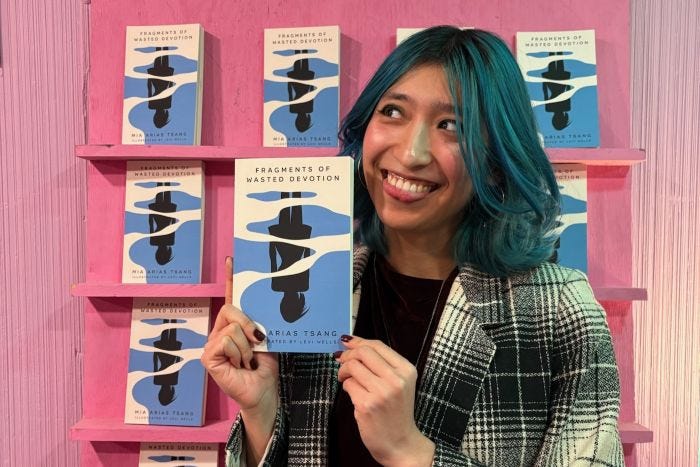
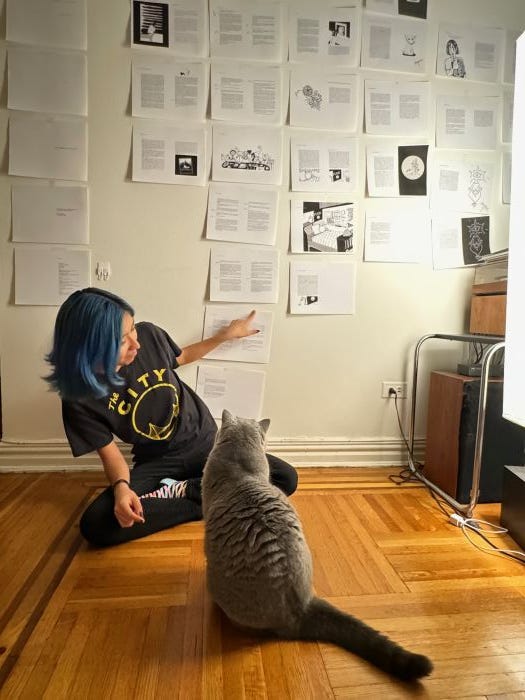
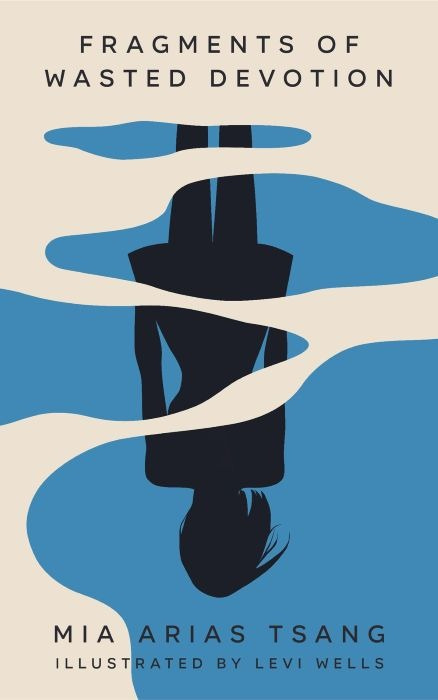
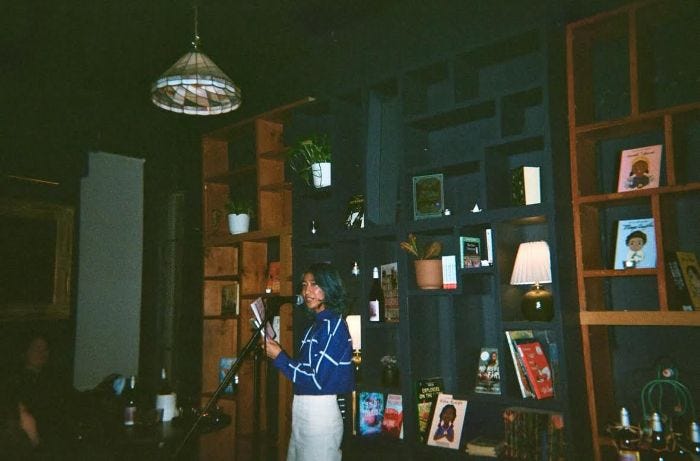
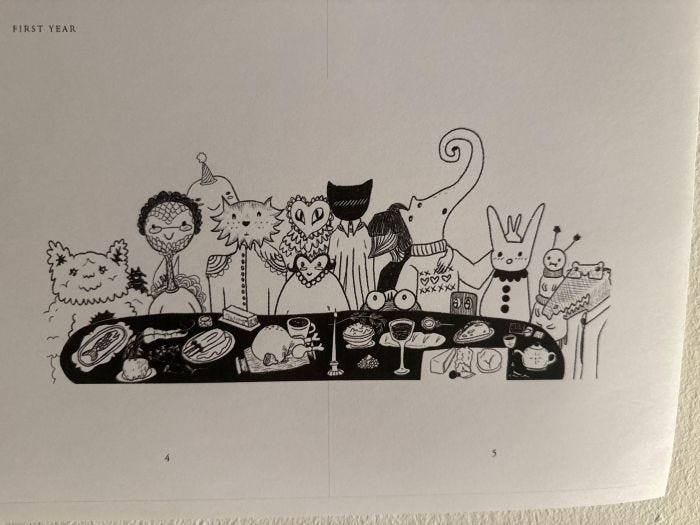

tysm @Michael Colbert for talking with me about my debut!! such a fun virtual chat :’) 💘